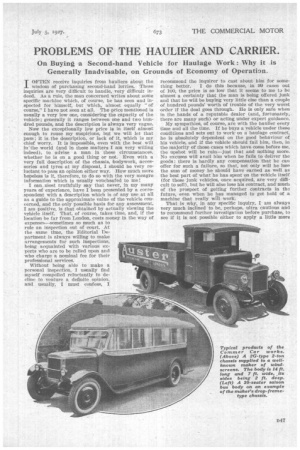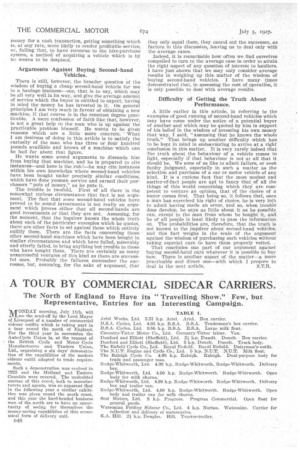PROBLEMS OF THE HAULIER AND CARRIER.
Page 101

Page 102

If you've noticed an error in this article please click here to report it so we can fix it.
On Buying a Second-hand Vehicle for Haulage Work : Why it is Generally Inadvisable, on Grounds of Economy of Operation.
T OFTEN receive inquiries from hauliers about the 1 wisdom of purchasing second-hand lorries. These inquiries are very difficult to handle, very difficult indeed. As a rule, the man concerned writes about some specific machine which, of course, he has seen and inspected for himself, but which, almost equally "of course," I have not seen at all. The price mentioned is usually a very low one, considering the capacity of the vehicle; generally it ranges between one and two hundred pounds, and the description is always very vague.
Now the exceptionally low price is in itself almost enough to rouse my suspicions, but we will let that pass; it is the description, or lack of it, which is my chief worry. It is impossible, even with the best will in the world (and in these matters I am very willing indeed), to advise a man in these circumstances, whether he is on a good thing or not. Even with a very full description of the chassis, bodywork, accessories and tyres at my disposal, I should be very reluctant to pass an opinion either way. How much more hopeless is it, therefore, to do so with the very meagre information which is usually vouchsafed to me!
I can most truthfully say that never, in my many years of experience, have I been presented by a correspondent with a description which is of any use at all as a guide to the approximate value of the vehicle concerned, and the only possible basis for any assessment, I am positive, is that obtained by actually viewing the vehicle itself. That, of course, takes time, and, if the location be far from London, costs money in the way of expenses--sometimes so much as to rule an inspection out of court. At the same time, the Editorial Department is always willing to make arrangements for such inspections, being acquainted with various experts who are to be relied upon and who charge a nominal fee for their professional services.
Without being able to make a personal inspection, I usually find myself compelled reluctantly to decline to venture a definite opinion, and usually, I must confess, I recommend the inquirer to cast about him for some-.
thing better. I do this because, in 99 cases out of 1VO, the price is so low that it seems to me to be almost a certainty that the man is being offered junk and that he will be buying very little else than a couple of hundred pounds' worth of trouble of the very worst order if the deal goes through. He is only safe when in the hands of a reputable dealer (and, fortunately, there are many such) or acting under expert guidance.
My sympathies, of course, are with the haulier every time and all the time. If he buys a vehicle under these conditions and sets out to workon a haulage contract, he is absolutely dependent on the good behaviour of his vehicle, and if the vehicle should fail him, then, in the majority of those cases which have come before me, the upshot will be ruin—just that and nothing more. No excuses will avail him when he fails to deliver the goods: there is hardly any compensation that he can offer for such a failure, so that, not only will he lose the sum of money he should have earned as well as the best part of what he has spent on the Vehicle itself (for these junk vehicles, once acquired, are very difficult to sell), but he will also lose his contract, and much of the prospect of getting further contracts in the future, even when he has managed to get hold of a machine that really will work.
That is why, in any specific inquiry, I am always very much inclined to be, perhaps, ultracautious and to recommend further investigation before purchase, to see if it is not possible either to apply a little more
money for a cash transaction, getting something which is, at any rate, more likey to render profitable service, or, failing that, to have recourse to the hire-purchase system, a method of acquiring a vehicle which is by no means to be despised.
Arguments Against Buying Second -hand Vehicles.
There is still, however, the broader question of the wisdom of buying a cheap second-hand vehicle for use in a haulage business—one, that is to say, which may be all very well in its way, and give the average amount of service which the buyer is entitled to expect, having in mind the money he has invested in it. On general principles I am very much in favour of obtaining a new machine, if that course is in the remotest degree practicable. A mere confession of faith like that, however, is not a great help to the man who is up against the practicable problem himself. He wants to be given reasons which are a little more concrete. What I am desirous of doing in this article is to satisfy the curiosity of the man who has three or four hundred pounds available and knows of a machine which can be had for about that figure. He wants some sound arguments to dissuade him from buying that machine, and he is prepared to cite instances—and here is the rub I—he may cite instances within his own knowledge where second-hand vehicles have been bought under precisely similar conditions, which have done yeoman service and earned their purchasers "pots of money," as he puts it.
The trouble is twofold. First of all there is the somewhat curious circumstance that fact is not argument. The fact that some second-hand vehicles have proved to be sound investments is not really an argument which proves either that all second-bands are good investments or that they are not. Assuming, for the moment, that the inquirer knows the whole truth about each of the particular examples which he quotes, there are other facts to set against these which entirely nullify them. There are the facts concerning those other second-hand machines which have been bought in similar circumstances and which have failed, miserably and utterly failed, to bring anything but trouble to those who have bought them. There are certainly as many unsuccessful ventures of this kind as there are successful ones. Probably the failures outnumber the successes, but, assuming, for the sake of argument, that they only equal them, they cancel out the successes, as factors in this discussion, leaving us to deal only with the average eases.
Indeed, it is remarkable how often we find ourselves compelled to turn to the average case in ordP.r to attain the right aspect of any question of interest to hauliers. I have just shown that we may only consider average results in weighing up this matter of the wisdom of buying second-hand vehicles. I have many times demonstrated that, in assessing the cost of operation, it is Only possible to deal with average results.
Difficulty of Getting the Truth About Performance.
A little earlier in this article, in referring to the examples of good running of second-hand vehicles which may have come under the notice of a potential buyer of another-and which may be quoted by him in support of his belief in the wisdom of investing his own money that way, I said, "assuming that he knows the whole truth." That brings up another difficulty which has to be kept in mind in endeavouring to arrive at a right conclusion in this matter. It is very rarely indeed that the truth about the behaviour of a vehicle comes to light, especially if that behaviour is not at all that it should be. We none of us like to admit failure, or even faulty judgment, especially in such a matter as the selection and purchase of a car or motor vehicle of any kind. It is a curious fact that the most modest and matter-of-fact people are apt to fancy that of all the things of this world concerning which they are competent to venture an opinion; that of the choice of a motor comes first. That being so, it follows that, once a man has exercised his right of choice, he is very loth to admit having made an error, and so, when trouble does develop, he says as little about it as he possibly can, except to the man from whom he bought it, and he of all people is least likely to pass the information on. The probabilities are, therefore, that the truth is not known to the inquirer about second-hand vehicles, and this fact weighs in the scale of the argument against the wisdom of purchasing such vehicles without taking especial care to have them properly vetted. .
That concludes one part of our argument against buying second-hand cars wherever it is possible to buy new. There is another aspect of the matter—a more practicable and direct one—with which I propose to deal in the next article. S.T.R.












































































































































































